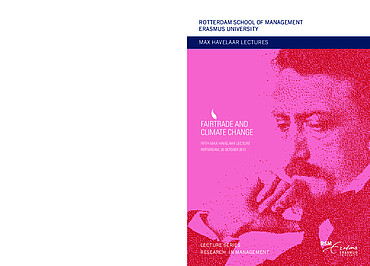Abstract
Can climate and development issues be tackled through partnerships? In view of the very limited number of multi-stakeholder partnerships for climate change in general, and those focused on development (developing countries) in particular, it seems useful to take a step back and consider the linkages between climate and development in a bit more detail. Also: what are the finance perspectives on climate change? And how do farmers look at the topic? Is there a trade-off between fairtrade and climate change? The fifth Max Havelaar Lecture considers these tensions. Position paper written by Ans Kolk and Jonathan Pinkse.
Poverty alleviation constitutes a multi-faceted problem. It is on the one hand extremely local and leads to enormous deprivation of at least half of the world’s population. But on the other hand, it is an extremely international problem as well through the operation of global markets – in particular of resources – and the functioning of value chains. It has increasingly become acknowledged that the role of corporations and the private sector is vital for sustainable solutions to poverty.
Entrepreneurial solutions are often considered preferable to the traditional approach of development aid and subsidies. Micro-credits and fair trade labels are typical examples of this new development paradigm. At the same time, however, it is clear that the involvement of private (international) corporations is far from undisputed. The claim that the profit maximisation strategies of private corporations can ‘solve’ poverty requires substantial modifications. It is obvious that some strategies are more effective than others. The integration of developing countries in the international supply chains of multinational corporations can have positive and negative repercussions. The new development paradigm therefore is not yet established, let alone undisputed. The Max Havelaar lecture stimulates the thinking on these issues in a balanced manner, without making use of the usual simplifications either in support of or against the involvement of firms in development. The Max Havelaar organisation is proof of this approach: it is aiming at a continuous improvement in its strategy towards labeling products – increasingly in a variety of partnerships with NGOs, corporations and governments.
The Max Havelaar lecture has seven aims:
- Provide a platform for the presentation of state-of-the-art scientific insights into how sustainable business and development cooperation can be combined
- Discuss the advantages and disadvantages of the involvement of corporations in poverty alleviation in a systematic and non-ideological manner
- Address the complexities of sustainable development rather than engage in simplifications on poverty, in order to come up with realistic – and obtainable – approaches to address in particular poverty (Millennium Development Goal 1)
- Discuss the strengths and weaknesses of specific approaches such as trade marks, codes of conduct, reporting or governance measures
- Provide an arena in which innovative ideas can be launched
- Consider development as part of international value chains in which a fair distribution of income, power and knowledge is an issue that affects both developed and developing economies
- Start a structured dialogue on shaping the preconditions for effective partnerships between public and private parties (including firms and NGOs) for development (Millenium Development Goal 8)
